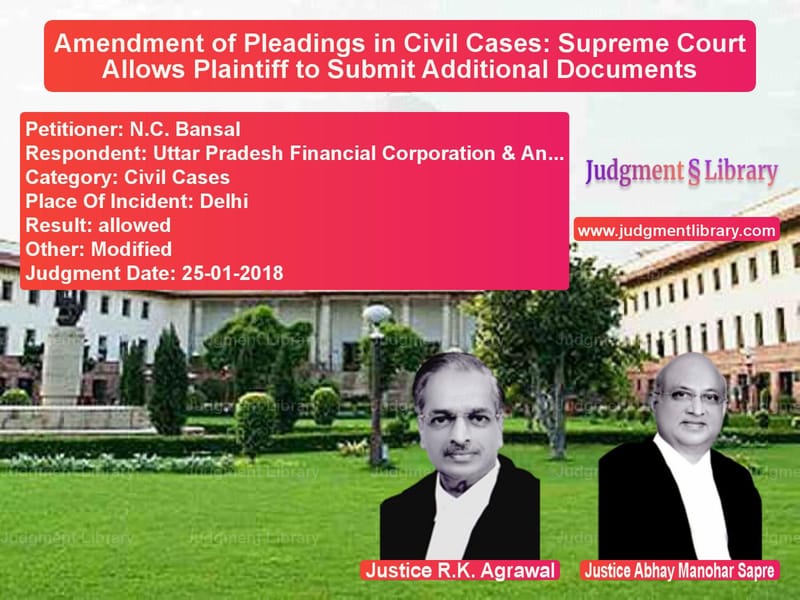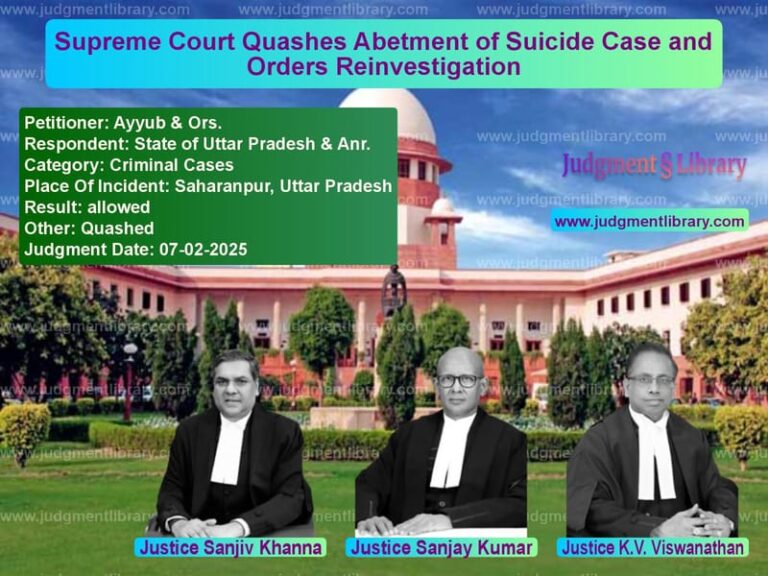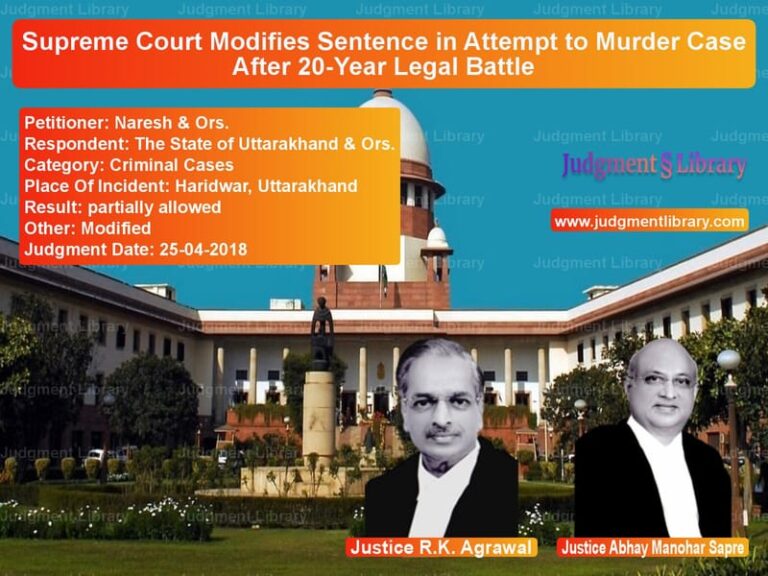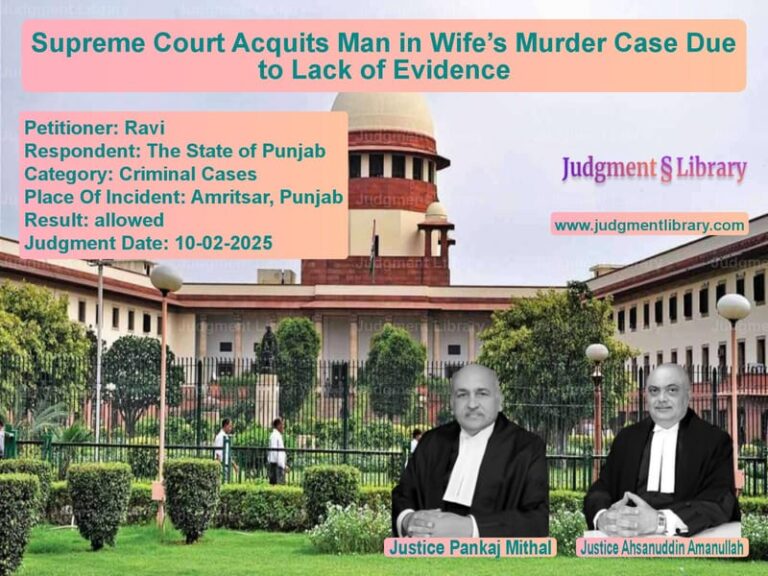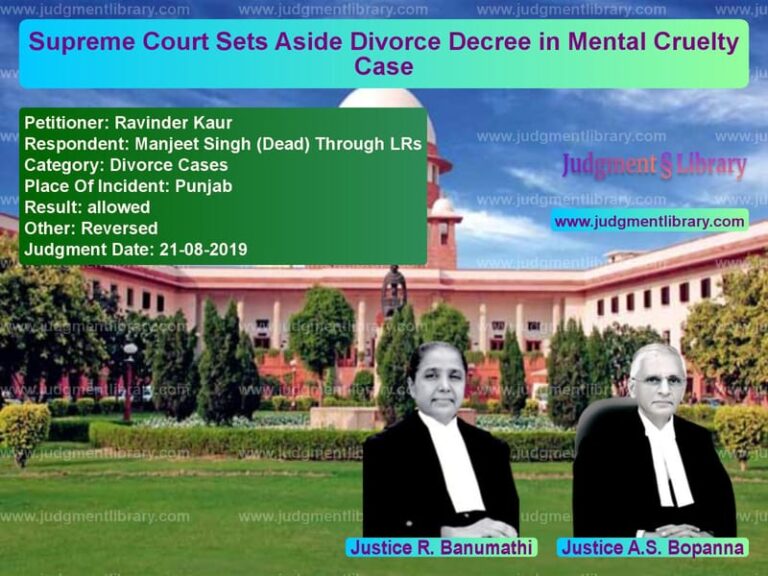Amendment of Pleadings in Civil Cases: Supreme Court Allows Plaintiff to Submit Additional Documents
The Supreme Court of India, in the case of N.C. Bansal vs. Uttar Pradesh Financial Corporation & Anr., addressed an important legal issue regarding the amendment of pleadings and submission of additional documents in civil suits. The ruling provides clarity on when courts should permit amendments in pleadings and the filing of additional documents, particularly when the trial has not yet commenced.
Background of the Case
The case arose from a civil suit filed by N.C. Bansal against the Uttar Pradesh Financial Corporation and another party. The plaintiff sought a declaration and permanent injunction concerning certain properties, arguing that they were not subject to mortgage or collateral security under the defendants.
During the course of the proceedings, the plaintiff filed three applications:
- An application under Order 7 Rule 14 of the Code of Civil Procedure (CPC) to submit additional documents.
- An application under Order 6 Rule 17 of the CPC seeking amendment of the plaint.
- An application requesting directions for the respondents to produce original documents.
The trial court dismissed all three applications, and the High Court upheld the trial court’s decision. Aggrieved by this, the plaintiff approached the Supreme Court.
Key Legal Issues
- Should the plaintiff be allowed to amend the plaint when the trial has not yet begun?
- Can additional documents be submitted at this stage of the proceedings?
- Was the trial court correct in rejecting the plaintiff’s applications?
Arguments by the Petitioner (N.C. Bansal)
The plaintiff, represented by his counsel, argued:
- The trial had not yet commenced, so there was no delay in filing the amendment application.
- The proposed amendments did not change the nature of the suit but merely clarified existing claims.
- The additional documents sought to be filed were obtained through Right to Information (RTI) and were relevant to the case.
- The rejection of the applications without considering the merits was unfair and would cause prejudice to the plaintiff.
Arguments by the Respondents (Uttar Pradesh Financial Corporation & Anr.)
The respondents countered these claims by asserting:
- The applications were filed at a belated stage and should have been made earlier.
- The proposed amendments would unnecessarily prolong the litigation.
- The documents sought to be introduced should have been submitted at the time of filing the suit.
- The trial court and High Court had correctly rejected the applications, and there was no need for Supreme Court intervention.
Supreme Court’s Observations
The Supreme Court analyzed the issue in light of procedural law and judicial precedents. The key observations were:
- “The suit is still at the initial stage, and the trial has not yet begun. The delay in seeking amendment and filing documents is not significant.”
- “The amendments sought do not change the nature of the suit but are intended to bring clarity to the pleadings.”
- “The courts should take a liberal approach in allowing amendments when no prejudice is caused to the opposing party.”
- “The additional documents sought to be filed are relevant to the case and should be admitted.”
Supreme Court’s Judgment
The Supreme Court ruled in favor of the plaintiff, allowing the amendment of pleadings and submission of additional documents. The Court directed:
- The applications under Order 7 Rule 14 and Order 6 Rule 17 were to be allowed.
- The plaintiff must pay a cost of ₹10,000 to the respondents.
- The amendment to the plaint should be incorporated within one month.
- The respondents would be granted an opportunity to amend their written statement in response to the amended pleadings.
- The case should be decided on its merits without being influenced by previous judicial observations.
Key Legal Precedents Considered
The Court referred to several important judgments, including:
- Revajeetu Builders & Developers vs. Narayanaswamy (2009): Established guidelines for allowing amendments in pleadings.
- J. Samuel vs. Gattu Mahesh (2012): Held that amendments should not be refused if they help in determining the real controversy.
- K.K. Velusamy vs. N. Palanisamy (2011): Stressed that courts should be flexible in allowing additional documents if they are necessary for justice.
Implications of the Judgment
This ruling has significant implications for civil litigation:
- Courts should adopt a liberal approach in allowing amendments before the commencement of trial.
- Additional documents can be admitted if they are relevant and obtained through proper legal means.
- Litigants should not be penalized for procedural delays if they act in good faith.
- The decision ensures that cases are decided on their substantive merits rather than technical procedural barriers.
Conclusion
The Supreme Court’s decision in N.C. Bansal vs. Uttar Pradesh Financial Corporation & Anr. reinforces the importance of flexibility in procedural law to achieve substantive justice. The ruling ensures that parties have a fair opportunity to present their case and that legal proceedings do not become unduly rigid. By allowing the amendment and additional documents, the Court has emphasized that procedural rules should facilitate, rather than obstruct, the delivery of justice.
Don’t miss out on the full details! Download the complete judgment in PDF format below and gain valuable insights instantly!
Download Judgment: N.C. Bansal vs Uttar Pradesh Financ Supreme Court of India Judgment Dated 25-01-2018.pdf
Direct Downlaod Judgment: Direct downlaod this Judgment
See all petitions in Contract Disputes
See all petitions in Property Disputes
See all petitions in Judgment by R K Agrawal
See all petitions in Judgment by Abhay Manohar Sapre
See all petitions in allowed
See all petitions in Modified
See all petitions in supreme court of India judgments January 2018
See all petitions in 2018 judgments
See all posts in Civil Cases Category
See all allowed petitions in Civil Cases Category
See all Dismissed petitions in Civil Cases Category
See all partially allowed petitions in Civil Cases Category

